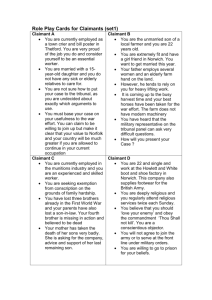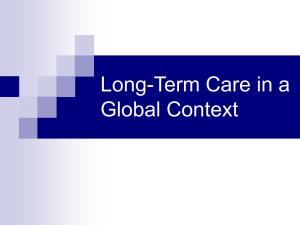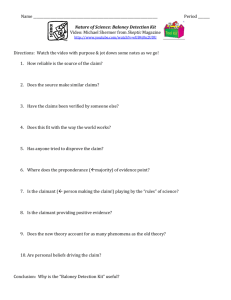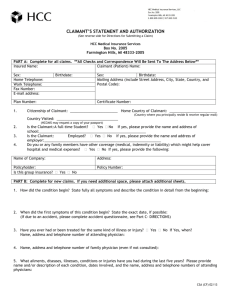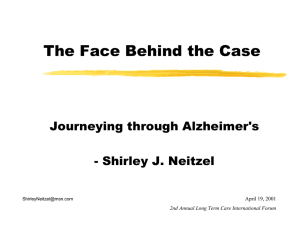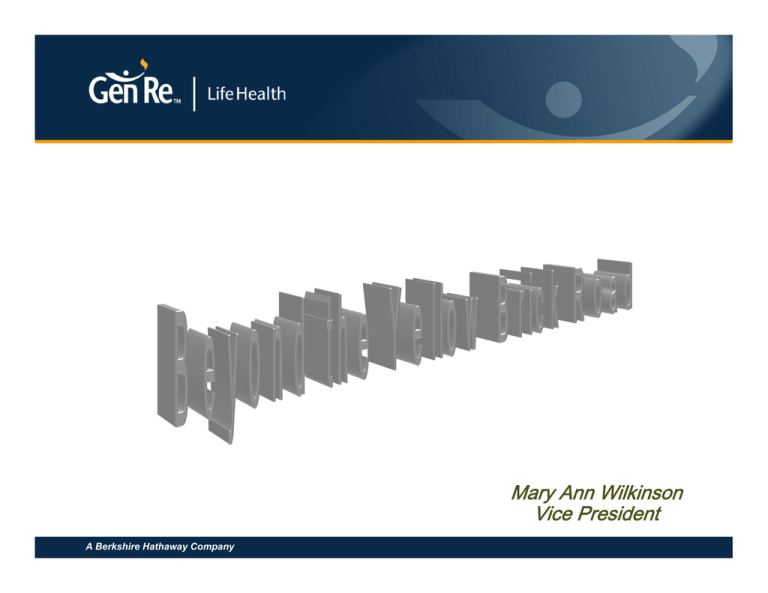
Mary Ann Wilkinson
Vice President
A Berkshire Hathaway Company
1
The material contained in this presentation has been prepared solely
for informational purposes by Gen Re LifeHealth. The content of this
presentation is intended to provide a general guide to the subject
matter. Specialist advice should be sought about your specific
circumstances. This document and its contents are proprietary to
Gen Re LifeHealth.
Copyright © 2003 General Re Life Corporation. All rights reserved.
A Berkshire Hathaway Company
2
The Journey
Building a Claim Management Program
• What do LTC insurers wish for?
• Why do LTC insurers think they can’t?
• What do LTC insurers already possess?
• How can LTC insurers do it?
3
Over the Rainbow
What We Wish For
• Tools
• Permission
• Exoneration
4
Tools - Why We Can’t
• Industry hasn’t developed them
• No empirical data to support them
• Too many what if’s
• No one else is doing it
5
Permission – Why We Can’t
• Policyholder
– I didn’t sign up with you
• Agent
– They won’t sign up with you
• DOI
– We won’t let anyone sign up with you
6
Exoneration – Why We Can’t
• Liability
• Senior Management
• Public Opinion
7
Tools – Why We Can
• We are the industry
• We have the data
• We know the basic tenets of claim management
• Our inaction compounds LTC’s fragile financial margins
8
Permission – Why We Can
• Improves
quality of life for our
policyholders.
• Is within the scope of benefit
management
• Protects our stakeholders
9
Exoneration – Why We Can
• Claim management programs provide
disciplined objective decision making
• Claim management programs
support stability of the policy
• Fiduciary responsibility
10
How We Will Do It – Move Away From Today
Nursing Home
Family
Physician
Home Care
Agency
ALF
Claim Manager
11
How We Will Do It Tomorrow
Physician
Claim Manager
Family
Therapeutic
Services
Support System
Assisted Living
Social Services
Home Care
Nursing Home
Community
Resources
Medicare
12
Tools – How We Will Do It
• Establish Program’s Goal
Identify and coordinate care and service that promotes
improved functional status, safety, and health of our
policyholders by using the following to manage eligible claims:
¾ the right services
¾ in the right setting
¾ at the right cost
13
Tools - How We Will Do It
• Establish Program’s Objectives
– Provide a well-defined and accessible point of entry to access
long-term care benefits.
– Make service decisions with input from the claimant and the
claimant’s family, utilizing a multi-disciplinary approach and
comprehensive assessments, regardless of payment source.
– Provide services in the least restrictive setting designed to meet
the individual needs of the functionally and/or cognitively
impaired claimant.
14
Tools - How We Will Do It
• Establish Program’s Objectives
– Provide services that fall within the policy’s benefits by
maximizing the utilization of available resources.
– Augment, not replace, family members and other informal
support systems currently involved with the claimant’s care.
– Provide services that minimize identified threats to the
claimant’s safety and health.
15
Tools - How We Will Do It
• Establish Program’s Objectives
– Provide a process for identifying and utilizing cost effective
alternatives that promote independence.
– Provide a process for accessing and managing home and
community-based services.
– Provide a process to determine if services provided remain
appropriate.
16
Permission - How We Will Do It
• The Claim Management Program :
– Supports a policyholder centric plan of care.
– Provides the appropriate level, frequency,
and site of LTC services.
– Regardless of who pays for it.
17
Exoneration - How We Will Do It
• Establish an interdepartmental Quality Assurance
Program that:
– Ensures that the outcomes of your Claim Management
Program meet its goals and objectives.
– Ensures that benefits provided to the policyholder meet
the insurer’s obligations under the policy.
18
Conclusion
We already possess that which we most desire...
the brains, heart, and courage to manage claims
and produce positive outcome for our insureds.
19
20


